Fighting over,
a brick coloured stain.
After the shells,
all that remains
A foreign field,
a lake of mud.
Tinted red,
with good mens blood
In a place
called Passchendaele
In a town
called Passchendaele
You feel the dread,
you smell the fear.
Grasping a photo,
of all you hold dear
Over the top,
once more we go
Shot down or drown,
the reaper sows
In a place
called Passchendaele
In a hell
called Passchendaele
Withdrawn now from the front
Those that have born the brunt
Revolution, mutiny
What, pray tell will come of me?
Don’t they know, we’ve had our fill
Tell them I don’t wanna kill
Tommy’s now, strapped to a gun
Field punishment number one
In a place
called Passchendaele
Through a hell
called Passchendaele
March along the Menin Road,
Hellfire corner fed and done.
Puts down a sandbag, longs for home
and blows his foot off with a gun
The court martial they don’t care,
Six minutes, and he’s been tried.
At dawn’s light he hears the prayer,
The paper square has been tied
Lack of morale fibre
Example needed, to be seen
For the honour of the regiment
he’s shot dead at just nineteen
a brick coloured stain.
After the shells,
all that remains
A foreign field,
a lake of mud.
Tinted red,
with good mens blood
In a place
called Passchendaele
In a town
called Passchendaele
You feel the dread,
you smell the fear.
Grasping a photo,
of all you hold dear
Over the top,
once more we go
Shot down or drown,
the reaper sows
In a place
called Passchendaele
In a hell
called Passchendaele
Withdrawn now from the front
Those that have born the brunt
Revolution, mutiny
What, pray tell will come of me?
Don’t they know, we’ve had our fill
Tell them I don’t wanna kill
Tommy’s now, strapped to a gun
Field punishment number one
In a place
called Passchendaele
Through a hell
called Passchendaele
March along the Menin Road,
Hellfire corner fed and done.
Puts down a sandbag, longs for home
and blows his foot off with a gun
The court martial they don’t care,
Six minutes, and he’s been tried.
At dawn’s light he hears the prayer,
The paper square has been tied
Lack of morale fibre
Example needed, to be seen
For the honour of the regiment
he’s shot dead at just nineteen
Contributed by Dq82 - 2021/11/25 - 13:07
Language: English
2018
The Great War
2014 was the centenary of the “war to end all wars” and I had the idea to compose some music around the subject. Rather than just release one song or EP in 2014, I decided it would be an interesting concept to release one song a year, from 2014 to 2018 that, combined, would form one (longer) piece of music.
In 2018 Bad Elephant approached me with the idea of releasing the project as a full album and this opportunity has allowed me to re-record and reinterpret the songs I had written since 2014 and also include some additional ones, the end result being The Great War album.
The Great War
2014 was the centenary of the “war to end all wars” and I had the idea to compose some music around the subject. Rather than just release one song or EP in 2014, I decided it would be an interesting concept to release one song a year, from 2014 to 2018 that, combined, would form one (longer) piece of music.
In 2018 Bad Elephant approached me with the idea of releasing the project as a full album and this opportunity has allowed me to re-record and reinterpret the songs I had written since 2014 and also include some additional ones, the end result being The Great War album.
PASSCHENDAELE
Fighting over a brick colour’d stain
After the shells all that remains
A foreign field, a lake of mud
Tinted red with good mens blood
In a place
called Passchendaele
In a town
called Passchendaele
You feel the dread, you smell the fear
Grasping a photo of all you hold dear
Over the top, once more we go
Shot down or drown, the reaper sows
In a place
called Passchendaele
In a hell
called Passchendaele
Withdrawn now from the front
Those that have born the brunt
Revolution, mutiny
What pray tell, will come of me
Don’t they know, w’had our fill
Tell them, I don’t wanna kill
Tommy’s now, strapped to a gun
Field punishment number one
In a place
called Passchendaele
Through a hell
called Passchendaele
March along the Menin Road
Hellfire corner said and done
Puts down a sandbag, marks the hole
and blows his foot off with a gun
The court martial they don’t care
six minutes, and he’s been tried
At dawn’s light he hears the prayer
the paper square, has been tied
Lack of morale fibre
example needed to be seen
For the honour of the regiment
he’s shot dead at just nineteen
Fighting over a brick colour’d stain
After the shells all that remains
A foreign field, a lake of mud
Tinted red with good mens blood
In a place
called Passchendaele
In a town
called Passchendaele
You feel the dread, you smell the fear
Grasping a photo of all you hold dear
Over the top, once more we go
Shot down or drown, the reaper sows
In a place
called Passchendaele
In a hell
called Passchendaele
Withdrawn now from the front
Those that have born the brunt
Revolution, mutiny
What pray tell, will come of me
Don’t they know, w’had our fill
Tell them, I don’t wanna kill
Tommy’s now, strapped to a gun
Field punishment number one
In a place
called Passchendaele
Through a hell
called Passchendaele
March along the Menin Road
Hellfire corner said and done
Puts down a sandbag, marks the hole
and blows his foot off with a gun
The court martial they don’t care
six minutes, and he’s been tried
At dawn’s light he hears the prayer
the paper square, has been tied
Lack of morale fibre
example needed to be seen
For the honour of the regiment
he’s shot dead at just nineteen
Contributed by Dq82 - 2021/11/25 - 13:15
×
![]()
Note for non-Italian users: Sorry, though the interface of this website is translated into English, most commentaries and biographies are in Italian and/or in other languages like French, German, Spanish, Russian etc.


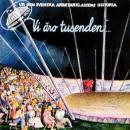
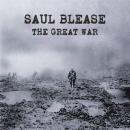
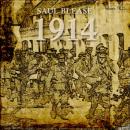
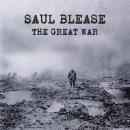
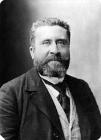
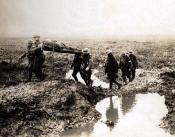
1917
1917 was written largely about the Battle of Passchendaele fought between July and December 1917 in some of the worst conditions of the whole war, and described by Lloyd George as "one of the greatest disasters of the war ... No soldier of any intelligence now defends this senseless campaign ..."
The song also references the changing political situations, the Russian Revolution and French army mutiny, as well as the less well known British mutiny at Étaples.
Finally 1917 addresses the executions of 306 British and Commonwealth soldiers in World War One, many of whom were suffering from shell shock and unfairly branded cowards. There is a little nod to Magnum's superb song on the subject Les Morts Dansant in the lyrics.